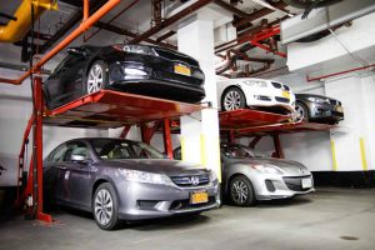Parking nowadays is upgraded into automated systems that multiplies parking capacity inside a parking lot. These parking systems are generally occupied or maintained by the hydraulic systems or electric motor systems. Parking systems maybe Traditional or Automated. There are different levels of parking available. As technology is skyrocketing these days keeping up with the new ideas and smart parking system is a tough job. For the most motorized vehicles, there are three commonly used parking arrangements they are: parallel parking, perpendicular parking, and angle parking.
The first-ever multi-story parking garage was built in 1918. It was built for the hotel La Salle and was designed by Holabird and Roche. The parking was several blocks away from the hotel. When the hotel was destructed in 1976, the parking structure stayed. As a result, this shows that a perfect parking system is important in our society. Talking about the history of Parking, It all started when humans started to invent vehicles. Instead of Walking humans started to invent new innovations to uplifts their daily lives. To comfort their daily life and for travel, vehicles were and still is essential. Before vehicles, people used to ride animals like Horse, Elephants. We slowly started to invent carriages. From where vehicles were invented. Even back in those days parking existed.
Now we live in the 21st century where technology is replacing every piece of work easing human efforts. The designs of the new parking system are tremendously changing in a short period of time. A good parking system must essentially include car and customer safety. Even though it is only for the vehicles one must feel comfortable about the system in the parking lot.
The Smart Parking continues to evolve as an increasing number of cities struggles with traffic and inadequate parking availability. The formation of sensor technologies continues to be core to the development of smart parking, a wide variety of other technology innovations are also enabling more adaptable systems—including cameras, data analytics, wireless communications, induction loops, smart parking meters, and advanced algorithms. The future of the smart parking system is expected to be remarkably influenced by the arrival of automated vehicles (AVs). Sundry cities around the world are already beginning to trial self-parking vehicles, specialized AV parking lots, and robotic parking valets. Partnered with global automaker Audi, Somerville, Massachusetts has planned to develop self-driving and self-parking systems. In 2018, a small bunch of cars with automated parking technology was deployed to test self-parking capabilities with a specialized nearby parking garage. The idea was; having cars that self-park will help improve traffic congestion considerably as riders/passengers could be dropped off in front of their destination and the car would self-park and minimize the time spent taking up space on the road (as opposed to drivers circling several blocks continuously looking for space). In 2020, stage two of the project is expected to commence with the deployment of a full fleet of self-parking Audi cars. By 2030, the self-parking system is targeting availability to the broader AV market. It is evaluated that parking garages specifically designed for self-parking cars can take up 60% less space than traditional parking lots.

